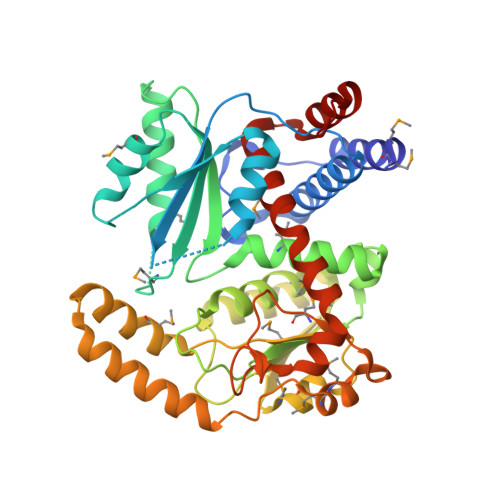The ygeW encoded protein from Escherichia coli is a knotted ancestral catabolic transcarbamylase.
Li, Y., Jin, Z., Yu, X., Allewell, N.M., Tuchman, M., Shi, D.(2011) Proteins 79: 2327-2334
- PubMed: 21557323
- DOI: https://doi.org/10.1002/prot.23043
- Primary Citation of Related Structures:
3Q98 - PubMed Abstract:
The allantoin degradation pathway in E. coli has long been thought to involve a putative novel oxamate transcarbamylase (OXTCase) that converts oxaluric acid to oxamate and carbamyl phosphate (CP), a substrate for carbamate kinase (CK). In the genome sequence of E. coli , the only gene that could encode a novel transcarbamylase is the ygeW gene. However, the recombinant protein has no transcarbamylase activity with oxamate, allantoin, or twenty five other related compounds as potential substrates. The crystal structures of this transcarbamylase with unknown function (UTCase) has been determined and refined at 2.0 Å resolution, providing structural insights into its possible function. Like N -acetyl-L-ornithine transcarbamylase and N -succinyl-L-transcarbamylase, UTCase has a deep 3 1 trefoil knot close to the active site, in contrast to aspartate transcarbamylase and ornithine transcarbamylase which do not have a knot. A Blast search of completed genomes indicates that 52 species including one non-bacterial species, Trichomonas vaginalis G3, have the ygeW gene. Gene context analysis and the structure of UTCase suggest that it is probably an ancestral catabolic transcarbamylase.
- Department of Integrative Systems Biology, Children's National Medical Center, The George Washington University, Washington, District of Columbia 20010, USA.
Organizational Affiliation:

















